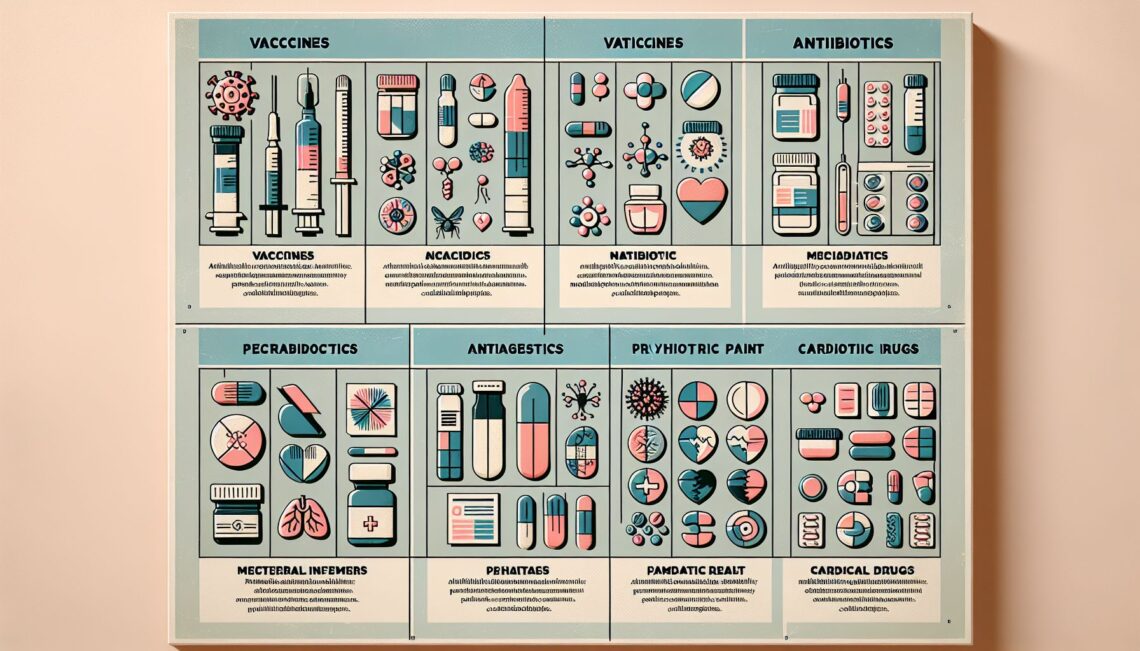
Understanding the Different Types of Medicines
Medicines play a significant role in maintaining our health and well-being. They help prevent, manage, and treat various medical conditions, allowing us to live healthier and more productive lives. However, not all medicines are created equal, as different types of medications target specific ailments and function in various ways. In this article, we will explore the different categories of medicines and their intended uses.
Introduction: The Importance of Medicines
Medications are vital instruments for medical professionals to carry out their duty of caring for patients effectively. They help alleviate symptoms, control chronic diseases, and sometimes even cure illnesses. Understanding the different types of medicines and how they work is crucial for patients to make informed decisions about their treatment plans.
Over-the-Counter (OTC) Medicines
Over-the-counter medicines are readily available without a prescription from a healthcare provider. These medications are typically used to address minor health issues, such as headache, cold symptoms, or indigestion. Examples of common OTC drugs include pain relievers (e.g., acetaminophen), antihistamines (e.g., loratadine), and cough syrups. It is important to follow the recommended dosage and consult a healthcare professional if symptoms persist or worsen.
Prescription Medicines
Prescription medicines, as the name suggests, require a doctor’s prescription to obtain. These medications are more potent and are used to treat moderate to severe medical conditions. Prescription drugs are carefully regulated to ensure their safety and efficacy. They often come with specific instructions, such as dosage, frequency, and duration of use. Antibiotics, opioids, antidepressants, and anticonvulsants are some examples of prescription medicines.
Complementary and Alternative Medicines (CAM)
Complementary and alternative medicines refer to treatment practices that are not commonly considered part of conventional medicine. These therapies are often used alongside traditional medical treatments to enhance their effectiveness or manage side effects. Examples of CAM include herbal remedies, acupuncture, chiropractic care, and aromatherapy. While some CAM approaches have shown promising results in certain situations, it is important to consult with medical professionals before incorporating them into a treatment plan.
Vaccines
Vaccines are a vital tool for disease prevention and public health. They work by stimulating our immune system to recognize and fight specific diseases. Vaccines can prevent illnesses like influenza, measles, polio, and hepatitis. They are typically administered through injections or, in some cases, orally. Vaccinations are recommended for individuals of all ages, following a specific schedule set by healthcare authorities.
Conclusion: Choosing the Right Medicine for Your Needs
Understanding the different types of medicines empowers us to make informed decisions about our healthcare. Over-the-counter medicines offer quick relief for minor ailments, while prescription drugs are crucial for managing more complex medical conditions. Complementary and alternative medicines, when used under medical supervision, can supplement conventional treatments. And of course, vaccinations play a vital role in preventing the spread of various diseases. Remember, when it comes to your health, consult with healthcare professionals to ensure the right medication for your specific needs.
You May Also Like

Different Types of Medicines
December 14, 2023
Exploring the Different Types of Medicines
March 19, 2024

